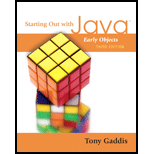Sorry! We don’t have solutions for this edition yet.
Solutions are available for other editions of this book
View 6th Edition solutionsarrow_forwardBook Details
Preface
Chapter 1: Introduction to Computers and Java
1.1 Introduction
1.2 Why Program?
1.3 Computer Systems: Hardware and Software
1.4 Programming Languages
1.5 What Is a Program Made of?
1.6 The Programming Process
1.7 Object-Oriented Programming
Chapter 2: Java Fundamentals
2.1 The Parts of a Java Program
2.2 The print and println Methods, and the Java API
2.3 Variables and Literals
2.4 Primitive Data Types
2.5 Arithmetic Operators
2.6 Combined Assignment Operators
2.7 Conversion between Primitive Data Types
2.8 Creating Named Constants with final
2.9 The String Class
2.10 Scope
2.11 Comments
2.12 Programming Style
2.13 Reading Keyboard Input
2.14 Dialog Boxes
2.15 Common Errors to Avoid
Chapter 3: A First Look at Classes and Objects
3.1 Classes
3.2 More about Passing Arguments
3.3 Instance Fields and Methods
3.4 Constructors
3.5 A BankAccount Class
3.6 Classes, Variables, and Scope
3.7 Packages and import Statements
3.8 Focus on Object-Oriented Design: Finding the Classes and Their Responsibilities
3.9 Common Errors to Avoid
Chapter 4: Decision Structures
4.1 The if Statement
4.2 The if-else Statement
4.3 The Payroll Class
4.4 The if-else-if Statement
4.5 Nested if Statements
4.6 Logical Operators
4.7 Comparing String Objects
4.8 More about Variable Declaration and Scope
4.9 The Conditional Operator (Optional)
4.10 The switch Statement
4.11 Formatting Numbers with the DecimalFormat Class
4.12 Focus on Problem Solving: The SalesCommission Class
4.13 The Random Class
4.14 Common Errors to Avoid
Chapter 5: Loops and Files
5.1 The Increment and Decrement Operators
5.2 The while Loop
5.3 Using the while Loop for Input Validation
5.4 The do-while Loop
5.5 The for Loop
5.6 Running Totals and Sentinel Values
5.7 Nested Loops
5.8 The break and continue Statements
5.9 Deciding Which Loop to Use
5.10 Introduction to File Input and Output
5.11 Common Errors to Avoid
Chapter 6: A Second Look at Classes and Objects
6.1 Static Class Members
6.2 Overloaded Methods
6.3 Overloaded Constructors
6.4 Passing Objects as Arguments to Methods
6.5 Returning Objects from Methods
6.6 The toString Method
6.7 Writing an equals Method
6.8 Methods That Copy Objects
6.9 Aggregation
6.10 The this Reference Variable
6.11 Inner Classes
6.12 Enumerated Types
6.13 Garbage Collection
6.14 Focus on Object-Oriented Design: Class Collaboration
6.15 Common Errors to Avoid
Chapter 7: Arrays and the Array List Class
7.1 Introduction to Arrays
7.2 Processing Array Contents
7.3 Passing Arrays as Arguments to Methods
7.4 Some Useful Array Algorithms and Operations
7.5 Returning Arrays from Methods
7.6 String Arrays
7.7 Arrays of Objects
7.8 The Sequential Search Algorithm
7.9 The Selection Sort and the Binary Search Algorithms
7.10 Two-Dimensional Arrays
7.11 Arrays with Three or More Dimensions
7.12 Command-Line Arguments and Variable-Length Argument Lists
7.13 The ArrayList Class
7.14 Common Errors to Avoid
Chapter 8: Text Processing and Wrapper Classes
8.1 Introduction to Wrapper Classes
8.2 Character Testing and Conversion with the Character Class
8.3 More about String Objects
8.4 The StringBuilder Class
8.5 Tokenizing Strings
8.6 Wrapper Classes for the Numeric Data Types
8.7 Focus on Problem Solving: The TestScoreReader Class
8.8 Common Errors to Avoid
Chapter 9: Inheritance
9.1 What Is Inheritance?
9.2 Calling the Superclass Constructor
9.3 Overriding Superclass Methods
9.4 Protected Members
9.5 Classes That Inherit from Subclasses
9.6 The Object Class
9.7 Polymorphism
9.8 Abstract Classes and Abstract Methods
9.9 Interfaces
9.10 Common Errors to Avoid
Chapter 10: Exceptions and Advanced File I/O
10.1 Handling Exceptions
10.2 Throwing Exceptions
10.3 Advanced Topics: Binary Files, Random Access Files, and Object Serialization
10.4 Common Errors to Avoid
Chapter 11: GUI Applications—Part 1
11.1 Introduction
11.2 Dialog Boxes
11.3 Creating Windows
11.4 Equipping GUI Classes with a main Method
11.5 Layout Managers
11.6 Radio Buttons and Check Boxes
11.7 Borders
11.8 Focus on Problem Solving: Extending the JPanel Class
11.9 Splash Screens
11.10 Using Console Output to Debug a GUI Application
11.11 Common Errors to Avoid
Chapter 12: GUI Applications—Part 2
12.1 Read-Only Text Fields
12.2 Lists
12.3 Combo Boxes
12.4 Displaying Images in Labels and Buttons
12.5 Mnemonics and Tool Tips
12.6 File Choosers and Color Choosers
12.7 Menus
12.8 More about Text Components: Text Areas and Fonts
12.9 Sliders
12.10 Look and Feel
12.11 Common Errors to Avoid
Chapter 13: Applets and More
13.1 Introduction to Applets
13.2 A Brief Introduction to HTML
13.3 Creating Applets with Swing
13.4 Using AWT for Portability
13.5 Drawing Shapes
13.6 Handling Mouse Events
13.7 Timer Objects
13.8 Playing Audio
13.9 Common Errors to Avoid
Chapter 14: Recursion
14.1 Introduction to Recursion
14.2 Solving Problems with Recursion
14.3 Examples of Recursive Methods
14.4 A Recursive Binary Search Method
14.5 The Towers of Hanoi
14.6 Common Errors to Avoid
Appendix A Getting Started with Alice
Index
Appendixes and Case Studies on the Student CD-ROM
Appendix B The ASCII/Unicode Characters
Appendix C Operator Precedence and Associativity
Appendix D Java Key Words
Appendix E Installing the JDK and JDK Documentation
Appendix F Using the javadoc Utility
Appendix G More about the Math Class
Appendix H Packages
Appendix I Working with Records and Random Access Files
Appendix J Using JBuilder 8
Appendix K The QuickSort Algorithm
Appendix L Answers to Checkpoints Questions
Appendix M Answers to Odd-Numbered Review Questions
Case Study 1 The Amortization Class
Case Study 2 The PinTester Class
Case Study 3 Parallel Arrays
Case Study 4 The SerialNumber Class
Case Study 5 A Simple Text Editor Application
More Editions of This Book
Corresponding editions of this textbook are also available below:
